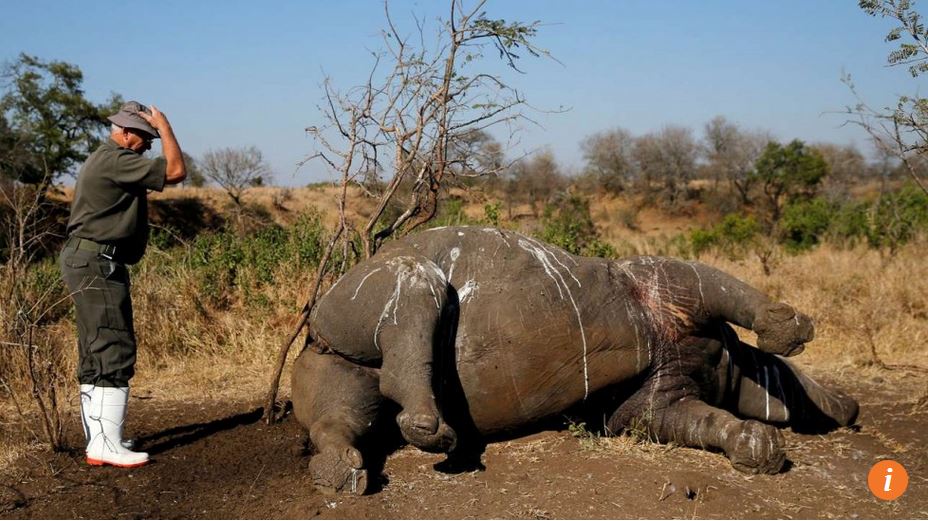http://www.scmp.com/news/asia/south...mmed-doing-little-stop-rhino-horn-trafficking
Vietnam slammed for doing little to stop rhino horn trafficking
PUBLISHED : Tuesday, 27 September, 2016, 2:28pm
UPDATED : Tuesday, 27 September, 2016, 2:28pm
Associated Press

Vietnam has become the biggest hub in the world for trafficking in horns and other body parts of the rhinoceros, a critically endangered species that is being killed by poachers in South Africa at the rate of one every eight hours.
An estimated 1,300 rhinos are slaughtered for their horns across Africa annually – up from just 100 in 2008 – with the bulk of rhino horn smuggled by criminal gangs into Vietnam, according to surveys by international wildlife trade experts.
Yet Vietnam hasn’t launched a single successful high-level prosecution against illegal rhino horn traders.
The standing committee of CITES, the Convention on Trade in Endangered Species, meeting this week in South Africa, has warned Vietnam that the body will not tolerate the country’s failure to enforce bans on the rhino horn trade.
The warning suggests that possible trade sanctions could be in the offing as early as next year.
CITES is responsible for regulating trade in endangered species, including bans where appropriate, but depends on member states to enforce the ban.
“It’s beginning to look like the only way they will take it seriously is sanctions,” said Colman O’Criodain, trade analyst with the World Wildlife Fund, who complains that Vietnam had resisted action on wildlife trafficking for years.
“For the past six years it’s been known that Vietnam is the biggest market for rhino horn. So far, over six years there has not been a decision to suspend trade with Vietnam,” he said.
In South Africa’s world famous Kruger National Park, the situation is dire: On average, 12 criminal gangs are operating at any one time in the park, according to South African authorities. Only 25,000 rhinos remain in Africa, most of them in South Africa, which has lost 6,000 since 2007. A total of 1,215 South African rhinos were poached and 1,175 were illegally killed last year.
Vietnamese among trio arrested in Togo over trade in 1.5 tonnes of ivory
Vietnam has made steps to improve compliance with international treaties.
In 2012, Hanoi signed an agreement with South Africa to begin controlling the illegal trade in rhino horn. In 2014, it joined 45 other countries in signing on to the London Declaration on illegal wildlife trade, committing to enforcing laws against wildlife poaching and reducing demand for illegal products. In recent years, Vietnam has amended its own laws to make trafficking in illegal wildlife products a crime.
But soaring demand among a newly prosperous middle class appears to have made prosecutions difficult, said Leigh Henry, senior policy adviser with the World Wildlife Fund, which sits on the CITES rhino working group.
“Requests have been made for Vietnam to report on specific items including seizures in the domestic market. They only reported one. The biggest concern that I have is that they have failed to launch prosecutions as a result of that seizure. We haven’t seen any enforcement actions for markets in Vietnam,” said Henry.
Bumper ivory hauls seized in Vietnam and Thailand, highlighting extent of illegal trade
Within CITES, the US and Britain have been the strongest advocates of tougher action to force Vietnam to comply, she said.
Pressure on Vietnam mounted this year, after a yearlong investigation by a Netherlands-based non-government organisation, the Wildlife Justice Commission, which identified the Vietnamese village of Nhi Khe as a major trafficking hub for illegal wildlife products. Investigators found staggering amounts of rhino horn, ivory, tiger products and other illegally traded items.
In Nhi Khe, WJC investigators identified enough rhino horn to account for just under half the animals poached in South Africa last year. Investigators identified the horns of 573 rhinos, 907 elephants and items from 225 tigers and other animals, worth more than US$53 million.
Investigators posing as buyers saw rhino horns and tiger bones piled onto electronic scales, and rooms piled with elephant tusks, according to one undercover investigator on the project, who cannot be named because it could jeopardise his work on future projects.
The investigation exposed WeChat and Facebook accounts used to advertise banned wildlife parts and 17 Chinese bank accounts used by traffickers to take payment from Chinese customers.
Undercover video footage gathered by the group shows a young woman sitting behind a counter in a Nhi Khe shop, as customers from China – the village’s main market – handle bracelets and necklaces made of rhino horn.
Call to legalise rhino horn trade splits world’s environmentalists
WJC executive director Olivia Swaak-Goldman, an international lawyer formerly with the International Criminal Court, said investigators were told by local people that police were bribed to overlook the trade.
“We have information from individuals that they feel that they don’t have to fear from the police, that they felt protected,” Swaak-Goldman said.
The group handed a 5,000-page file on Nhi Khe to the Vietnamese government in January, including evidence implicating 51 traders, but the government took no action against those identified.
